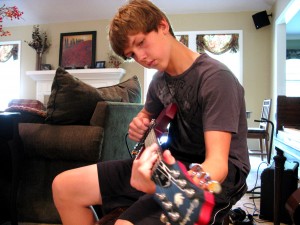Intro
Three thousand years ago an old man in a loin cloth (or a toga or a whatever – you get the idea) gently hit a young student on the head with his staff for banging the wrong beat on his drum.
Even way back in ancient times, someone like myself sat across from someone just like you and began together the process of learning an instrument.
Whether you’re a brand new student or someone who has had a guitar sitting in your closet for years just waiting for it to be woken up, this now is a new adventure.
So let’s get started from the beginning with my Six Ancient Secrets of Beginning Guitar.
1. There Are No Secrets
Sorry to say, there are no secrets or shortcuts or magic pills being hidden from you. But there are things to do and ways to be that can open doors that lead to self-satisfaction, enjoyment and a real sense of joy when you take on the challenge of beginning guitar.
As I’m sure you’ll discover, learning an instrument can be a wonderful adventure!
2. Making sure your guitar is in good playing shape
A guitar is like an automobile in that it needs to be tuned up in order to run right. I’m not talking about tuning the strings to the right pitch here but about your instrument’s playability: the height of the strings where you press them down onto the fingerboard; the adjustment of the neck so it is straight and true.
These kinds of things make a huge difference. Trust me.
On a recent Thursday evening, Doug showed up for his 7 o’clock lesson. After putting it off for many months, he had gone in and had his guitar “tuned up” and bought new strings.
Night and day! It played easier – more like butter – and the sound was alive!
Doug: “Oh my god! It’s like a new guitar. All that struggling and now…!”
I hope you’re listening out there! Like Doug, you may not know what kind of difference I’m talking about – until you do it!
3. The Teacher
There is no substitute for a really good teacher. Remember those thousands of years I referred to in my intro? There’s a tradition and a lineage here that has stayed steady.
That one-on-one relationship: the interaction and the natural real-time feedback on a consistent basis can’t be found in a book or on the internet.
But hey- I’m not looking for new students here. I’ve got plenty. And there is a ton of learning out there in books and dvds and on YouTube.
But here’s the giant “but!” Most people I’ve talked to over the years don’t get it that way.
They learn songs and exercises and “how to” skills but the energy and the forward flow of enjoyment and satisfaction seems to dribble away and the guitar goes back in the case.
A good teacher can provide the otherwise missing link to a lifetime filled with making your own music.
First there’s the consistency and accountability. Most folks can use a bit of that. There’s a guitar lesson every week; same time, same place, same two people.
You know when you show up that I’m gonna want to hear what you’ve got… what you’ve practiced.
I really don’t care how well you play. Really! But I do want to see that there’s been some movement… some engagement with the song or piece that let’s me know you’ve done a bit of work.
This accountability kind of thing happens every week. And so there’s that.
Then there’s the feedback I give and you get. It could be a little thing like the placement of a certain finger on a string. Or maybe you just didn’t get it at all and we need to re-boot. It’s all good.
We work from where we are. And then there’s the relationship. We have the privilege of being with each other in this intimate setting every week.
Of course I’m going to ask “How was your week?” We get to talk a bit and get to know and, hopefully, appreciate (and dare I say love?) each other.
Think about it. How many people do you get to do that with: one-on-one… just the two of you… every week?
So that background of mutual appreciation and respect is, for me, what makes this dance possible.
You might think this a little airy but it’s real and a real key to our learning beginning guitar.
4. 10,000 Hours Be Damned!
In his book “Outliers,” Malcolm Gladwell repeatedly mentions the “10,000-Hour Rule,” claiming that the key to achieving genuine expertise in any skill is, to a large extent, a matter of practicing for a total of 10,000 hours – give or take. I don’t have a beef with that. I mean whatever – I get the idea.
The myth isn’t in the numbers. It’s in my students’ thoughts about the numbers and how that can affect their progress and their enjoyment.
Now let’s see: If a recreational (“I’m just doing this for my own fun and satisfaction.”) student were to practice guitar five hours per week – and I think that’s a reasonable expectation – it would take around thirty-eight and a half years to be a really really top notch player.
Now I don’t know about you, but I’ve chosen at times not to do things in my life that would have taken too long.
I chose a two year Masters program instead of going for a six year Phd.
Did I miss out on a more fulfilling path? I’ll never know now. But I remember my thinking at the time: “Ugh. It’s gonna take forever. I can’t do that.”
Mike, a 64 year old retired man who’s been taking lessons with me for a couple of years, came in yesterday with a common ailment (The doctor is in):
“Jesus! I’ll never get anywhere. I keep banging away and it’s just not happening.”
He’s been listening to the recording of the song he’s working on. Performed, of course, by 10,000 hour-type men and women: pro players and singers. And he’s not stupid.
In fact he’s got a really good ear. He knows what he’s doing isn’t what they’re doing. And he also knows, because he’s been told, how long it’s gonna take him to ever get that good – if he ever does.
The tough part is he doesn’t like that news. In fact he rails against it. And that brings him up short in his practice and his enjoyment. The short answer to all this (the doctor speaking) is to just lighten up and enjoy the journey.
A bit corny, but good advice nonetheless – just not so easy to do in a rough moment. Very fortunately, the music itself provides an antidote to this funk if you let it.
It doesn’t matter what you’re practicing, even the easiest basic chords or the most basic strum or whatever.
When you focus and practice and get it down – really get it down – you become a master of that! 10,000 hours be damned! It’s all those little masteries!
That’s where the music happens, and it happens all along the way. So celebrate that, and take a tip and watch out when it’s going slow and you don’t like it.
5. Practice (The “P” Word)
You’re gonna get better. You’re gonna learn. No doubt. That’s just what happens when you put in the time. Isn’t it wonderful?
But how fast you learn and how well you learn has a little more to it than that.
Now let me interject here that this fifth Ancient Secret of Beginning Guitar is for practice – not for when things are more casual and/or social and you are busy banging away and singing “Country Roads” or some other tune you know inside out.
That’s something else.
Comin’ at ya here with some tips, some advice and some pearls of obvious wisdom…
- Don’t leave your guitar in its case under the bed in your room. Get a stand and let it hang out where you can see it and touch it and grab onto it anytime the spirit moves; for five minute or five hours.
- Set up a little practice space with a music stand and a straight-back chair or other seat that encourages awake focus. A couch with your music on the coffee table doesn’t really do that as well.
- Tune your guitar every day. Even if you play “House of the Rising Sun” perfectly, there’s no way it’ll sound good if you’re out of tune. If you have trouble tuning by ear, there are great electronic tuners available for less than fifteen bucks.
- Keep distractions at a distance. I make it a point to do a little detective work with my students. I dig in and ask all kinds of questions about what their practice at home looks like…
Jill, a fourteen year-old, is forced to practice in the kitchen while her mom
makes dinner and listens and criticizes.
My feeling here is that beginning guitar practice is essentially an intimate practice between you and you. For you. Practicing should be a private adventure.
Now if your mom or husband or daughter asks you to play a piece or a song for them… that’s a different ballgame.
That’s performing something you’ve learned.
Carl, a fifty-three year-old man, can’t practice when his wife is at home because she insists on having his undivided attention at all times. And she’s home a lot!
Carl winds up practicing very quietly, only after his wife has gone to bed; and all the time hoping he won’t wake her up. Talk about distractions!
Then there are the techno beeps and the texts and the emails and the phones and the sound of the TV in the next room. It goes on.
The real deal here is we’re not talking about a chore or a burden… this practicing.
Listen: Practice is the meat of the process that leads to playing the guitar.
Not playing it like you do now… kind of tentatively and searching… but really playing.
Really opening into PLAY! I’m here to tell you it’s all so very much worth it. The guitar has been this sweet friend traveling with me for most of my life. Such a huge gift! That just might be where you’re headed.
So… guess what?… Practice!
6. A Story of Someone Just Like You and Me
Once upon a time there was a forty-five year-old man named Jason who had a guitar sitting in his closet. It had been hiding there since his college days. One afternoon he noticed it while hanging up a shirt.
So he took it out and held it and strummed “Let It Be,” one of the few songs he remembered from those beginner guitar lessons he took way back when.
A few months went by and he found himself drawn to picking his guitar up once in a while and noodling around.
You see how things get started? More time went by and Jason played more and more. He remembered how much he always loved music.
He began lessons and his renewed musical life took off in earnest.
This is not a tale of a late-blooming rock star or an otherwise great musician. It’s much smaller and more mundane than that.
It’s a simple tale of a guy with limited natural talent, but who had a passion for music and a will to work at it.
That “will to work” paid dividends. He was able to see early on that if he put in the time… music might happen. And that fed his interest and enthusiasm.
It didn’t matter a lick to him that nothing came easy and that he wasn’t some super-talented guy. Six years later, Jason is just okay. He can play some sweet songs and pieces, but still is very much the struggling student.
And who cares? There’s no one here but Jason. It’s his musical world. And he’s in love with it.
Moral of the fable: If you wanna be a guitar warrior, be like Jason (me, smiling).
Outro:
When you clicked on “Six Ancient Secrets of Beginning Guitar,” you dialed my number. I sincerely hope you’ve got your money’s worth.
No tricks here on how to play this or that; no fancy licks. Just some ramblings and some gamblings that may in some way help you get rolling on the path of beginning guitar.
I’ll see you down the road!










Matt
July 1, 2015 at 3:37 amWhat an EPIC masterpiece!!! This is the perfect article for a beginning guitar student to read before they start the process. Well done!
GuitarHero
July 1, 2015 at 4:27 amVery thoughtful and useful! Perhaps Carl can interest his wife in singing along!